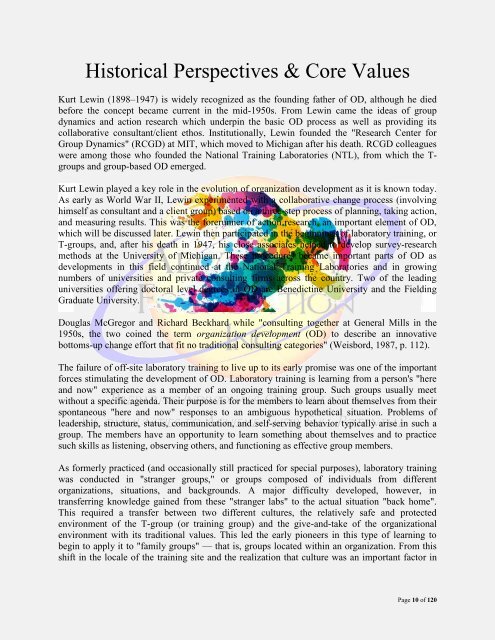Organizational Development - Vol. V, Part II
Organizational Development - Vol. V, Part II
Organizational Development - Vol. V, Part II
You also want an ePaper? Increase the reach of your titles
YUMPU automatically turns print PDFs into web optimized ePapers that Google loves.
Historical Perspectives & Core Values<br />
Kurt Lewin (1898–1947) is widely recognized as the founding father of OD, although he died<br />
before the concept became current in the mid-1950s. From Lewin came the ideas of group<br />
dynamics and action research which underpin the basic OD process as well as providing its<br />
collaborative consultant/client ethos. Institutionally, Lewin founded the "Research Center for<br />
Group Dynamics" (RCGD) at MIT, which moved to Michigan after his death. RCGD colleagues<br />
were among those who founded the National Training Laboratories (NTL), from which the T-<br />
groups and group-based OD emerged.<br />
Kurt Lewin played a key role in the evolution of organization development as it is known today.<br />
As early as World War <strong>II</strong>, Lewin experimented with a collaborative change process (involving<br />
himself as consultant and a client group) based on a three-step process of planning, taking action,<br />
and measuring results. This was the forerunner of action research, an important element of OD,<br />
which will be discussed later. Lewin then participated in the beginnings of laboratory training, or<br />
T-groups, and, after his death in 1947, his close associates helped to develop survey-research<br />
methods at the University of Michigan. These procedures became important parts of OD as<br />
developments in this field continued at the National Training Laboratories and in growing<br />
numbers of universities and private consulting firms across the country. Two of the leading<br />
universities offering doctoral level degrees in OD are Benedictine University and the Fielding<br />
Graduate University.<br />
Douglas McGregor and Richard Beckhard while "consulting together at General Mills in the<br />
1950s, the two coined the term organization development (OD) to describe an innovative<br />
bottoms-up change effort that fit no traditional consulting categories" (Weisbord, 1987, p. 112).<br />
The failure of off-site laboratory training to live up to its early promise was one of the important<br />
forces stimulating the development of OD. Laboratory training is learning from a person's "here<br />
and now" experience as a member of an ongoing training group. Such groups usually meet<br />
without a specific agenda. Their purpose is for the members to learn about themselves from their<br />
spontaneous "here and now" responses to an ambiguous hypothetical situation. Problems of<br />
leadership, structure, status, communication, and self-serving behavior typically arise in such a<br />
group. The members have an opportunity to learn something about themselves and to practice<br />
such skills as listening, observing others, and functioning as effective group members.<br />
As formerly practiced (and occasionally still practiced for special purposes), laboratory training<br />
was conducted in "stranger groups," or groups composed of individuals from different<br />
organizations, situations, and backgrounds. A major difficulty developed, however, in<br />
transferring knowledge gained from these "stranger labs" to the actual situation "back home".<br />
This required a transfer between two different cultures, the relatively safe and protected<br />
environment of the T-group (or training group) and the give-and-take of the organizational<br />
environment with its traditional values. This led the early pioneers in this type of learning to<br />
begin to apply it to "family groups" — that is, groups located within an organization. From this<br />
shift in the locale of the training site and the realization that culture was an important factor in<br />
Page 10 of 120

















